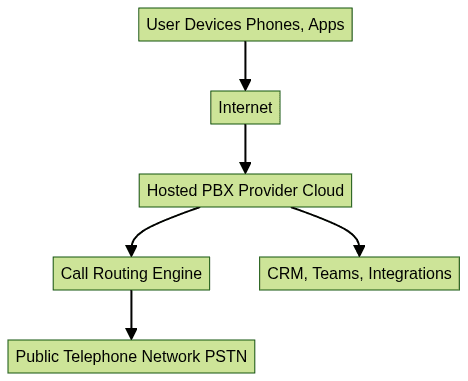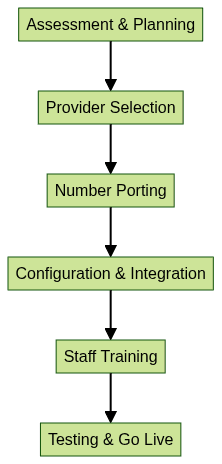Introduction to Hosted PBX Solutions
Hosted PBX solutions have become the backbone of modern business communications in 2025. As organizations seek more agile, scalable, and cost-effective ways to connect teams and clients, hosted PBX solutions stand out as a game-changer. Unlike traditional phone systems, hosted PBX leverages cloud telephony and VoIP to deliver robust business phone service without the need for on-premise hardware. By adopting hosted PBX solutions, companies can unlock advanced PBX features, enhance productivity, and support remote work with unified communications tools—all while maintaining high call quality and security. This article explores everything IT professionals and business leaders need to know about hosted PBX solutions, from architecture to pricing models and future trends.
What is a Hosted PBX Solution?
A hosted PBX solution is a cloud-based virtual PBX (Private Branch Exchange) service provided over the internet, replacing traditional on-premise PBX systems. Instead of maintaining phone system hardware onsite, businesses connect to a provider’s data center, which manages all call routing, voicemail, and advanced PBX features. Modern solutions often integrate with
Voice SDK
platforms, enabling developers to build custom voice experiences directly into business applications.How is Hosted PBX Different from Traditional PBX?
Traditional PBX requires significant hardware investment and onsite maintenance, limiting scalability and flexibility. In contrast, hosted PBX solutions are delivered entirely via cloud phone systems, allowing for rapid deployment, easy scalability, and remote management. Businesses benefit from features like auto-attendant, call routing, mobile apps, and integration with unified communications platforms such as Microsoft Teams. For organizations seeking to add real-time calling features, leveraging a
phone call api
can further enhance the flexibility and reach of their communication systems.Core Components of Hosted PBX Solutions
Hosted PBX solutions typically include the following core components:
- VoIP endpoints (desk phones, softphones, mobile apps)
- SIP trunking for VoIP call transport
- Cloud PBX software (call routing, voicemail, auto-attendant)
- Secure internet connectivity
- Management dashboard and analytics
For companies looking to add video collaboration, integrating a
Video Calling API
can extend hosted PBX functionality to support seamless video meetings alongside voice communications.Architecture Diagram

How Hosted PBX Solutions Work
Hosted PBX solutions function by routing voice calls over the internet using VoIP and SIP technologies. When a user places a call, the signal is sent securely to the provider’s cloud, where call routing logic determines the destination—be it another extension, voicemail, or an external number. This architecture eliminates the need for physical PBX hardware, enabling features like disaster recovery, mobile access, and seamless integration with unified communications. The result: businesses gain flexibility, reduced costs, and enterprise-grade reliability not possible with legacy systems. Developers can also utilize a
Voice SDK
to embed advanced voice capabilities into their applications, further streamlining communication workflows.Key Features of Hosted PBX Solutions
Modern hosted PBX solutions offer a range of features that empower business communications:
- Auto-attendant: Interactive voice menus that greet callers and direct them to the appropriate department or extension, improving customer experience and reducing manual transfers.
- Call routing and forwarding: Advanced call routing ensures calls are directed based on predefined rules, schedules, or caller identity—enabling efficient response and uptime. Businesses can enhance these capabilities with a
phone call api
, allowing for programmable call flows and integrations. - Voicemail to email: Voicemails are instantly delivered as audio files or transcriptions to users’ email, ensuring no important message is missed.
- Mobile and remote access: Users can make and receive business calls from anywhere using dedicated mobile apps or softphones, supporting remote and hybrid work models. Integrating a
Voice SDK
can further empower remote teams by enabling high-quality, real-time audio communication across devices. - Scalability and flexibility: Easily add or remove users, scale lines up or down, and integrate with other business applications as needs evolve.
Sample Call Routing Configuration
Here’s an example of a simple call routing configuration in JSON, illustrating how hosted PBX solutions programmatically manage call flow:
1{
2 "auto_attendant": {
3 "greeting": "Welcome to Acme Inc. For sales, press 1. For support, press 2.",
4 "options": {
5 "1": "route_to_sales",
6 "2": "route_to_support"
7 }
8 },
9 "routes": {
10 "route_to_sales": {
11 "forward_to": "+15551234567",
12 "fallback": "voicemail_sales"
13 },
14 "route_to_support": {
15 "forward_to": "+15559876543",
16 "fallback": "voicemail_support"
17 }
18 }
19}
20Advanced Features and Integrations
Hosted PBX solutions integrate seamlessly with leading business platforms such as CRM systems, Microsoft Teams, and unified communications tools. Multi-tenant capabilities allow service providers or enterprises to manage multiple business units or clients under a single platform, each with its own isolated PBX features. Advanced analytics provide real-time insights into call volume, duration, and customer engagement, empowering organizations to optimize their communication workflows. For businesses aiming to offer both audio and video conferencing, a
Video Calling API
can be a valuable addition, supporting richer collaboration experiences.Benefits of Hosted PBX Solutions for Businesses
Cost Savings and No Hardware
One of the main reasons businesses choose hosted PBX solutions is cost efficiency. With no need for on-premise PBX hardware or maintenance, organizations save on capital expenses and ongoing IT support. Cloud telephony operates on a subscription or usage model, removing the risk of technology obsolescence. Companies can further reduce costs and development time by leveraging a
phone call api
to automate and streamline voice communications.Easy Setup and Management
Hosted PBX solutions are designed for rapid deployment. Provisioning users, configuring call routing, and activating features can be done via intuitive web dashboards, often with zero-touch setup. IT teams can manage the entire business phone service remotely, reducing the need for onsite visits. For organizations looking to build custom voice features, integrating a
Voice SDK
can simplify the process and accelerate rollout.Improved Reliability and Disaster Recovery
Cloud-based PBX architecture provides built-in redundancy and automatic failover. In case of local outages or disasters, calls are automatically rerouted, ensuring business continuity. Providers typically offer Service Level Agreements (SLAs) guaranteeing uptime and call quality.
Enhanced Customer Service and Productivity
Hosted PBX solutions empower teams with features like auto-attendant, call analytics, and integration with CRM or helpdesk platforms. This leads to faster response times, improved customer satisfaction, and better tracking of communication metrics.
Choosing the Right Hosted PBX Provider
Selecting a hosted PBX provider is critical for reliable business communications. Consider these criteria:
- Reliability: Look for providers with proven uptime records and redundant infrastructure.
- Customer Support: 24/7, multi-channel support is vital for quick issue resolution.
- Feature Set: Ensure the hosted PBX solutions offered include both core and advanced features relevant to your business. If programmable voice features are important, consider providers that support a robust
phone call api
for easy integration. - Security: Robust encryption, fraud detection, and compliance with industry standards protect sensitive data.
- Pricing: Transparent pricing plans that align with your usage patterns and growth projections.
Evaluate providers using independent reviews and customer testimonials to gauge satisfaction and performance.
Hosted PBX Pricing Models
Hosted PBX pricing typically follows two models:
- Flat rate: Fixed monthly fee per user or extension, ideal for predictable budgeting.
- Per user/per feature: Charges based on the number of users or specific features activated.
Look for plans that provide flexibility to scale as your team grows without locking you into long-term contracts. Many providers offer the chance to
Try it for free
, allowing you to evaluate features and performance before making a commitment.Implementation Best Practices
A successful hosted PBX deployment follows these best practices:
- Assessment: Analyze current call flows, integration needs, and network readiness.
- Provider Selection: Choose a hosted PBX provider that aligns with your business requirements.
- Number Porting: Work with your provider to port existing business numbers without service interruption.
- Configuration: Set up call routing, auto-attendants, voicemail, and integrations.
- Staff Training: Educate employees on new features, mobile apps, and security best practices.
- Testing: Conduct thorough testing to validate call quality, failover, and usability.
For organizations building custom communication workflows, using a
Voice SDK
can streamline integration and ensure a smooth deployment process.Deployment Workflow Diagram

Common Challenges and How to Overcome Them
Adopting hosted PBX solutions can present some challenges:
- Network Requirements: Ensure sufficient bandwidth and QoS prioritization for VoIP traffic to maintain HD voice quality.
- Change Management: Address staff resistance with clear communication and comprehensive training.
- Support & Troubleshooting: Partner with a provider offering responsive support and a robust knowledge base. Use analytics and monitoring tools to quickly diagnose and resolve issues.
Future Trends in Hosted PBX Solutions
In 2025, hosted PBX solutions are embracing AI-driven voice assistants, predictive call analytics, and deeper integrations with remote and hybrid work tools. Expect smarter call routing, enhanced security measures, and richer insights into business communications as the industry evolves.
Conclusion: Why Hosted PBX Solutions are the Future
Hosted PBX solutions deliver unmatched flexibility, cost savings, and enterprise-grade features for modern businesses. By moving business communications to the cloud, organizations position themselves for agility, security, and future innovation. Now is the time to explore hosted PBX providers and transform your business phone service for the digital age.
Want to level-up your learning? Subscribe now
Subscribe to our newsletter for more tech based insights
FAQ